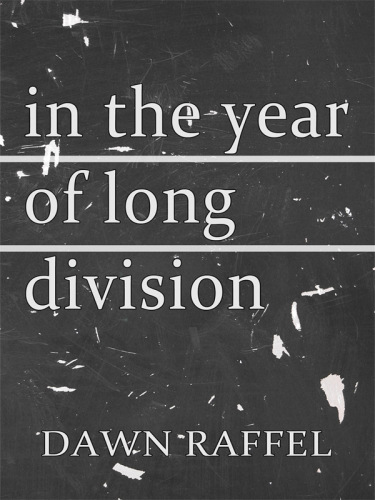
In the Year of Long Division
- اطلاعات
- نقد و بررسی
- دیدگاه کاربران
نقد و بررسی

Starred review from January 2, 1995
The stories in Raffel's first collection are like privet hedges: smooth and clipped, they fastidiously control what is revealed. The implication for the reader is double-edged; one can either be frustrated by the author's self-conscious, highly stylized prose or delighted that she trusts enough to leave so much detective work to the reader. In ``The Trick,'' for example, she writes of a couple: ``They were somewhere other than under the quilt''-a ruffling sentence perhaps, but one whose construction parodies the adulterous characters' inability to speak in direct terms. ``The trick is not to think,'' explains another character in the same tale. Several of the 16 stories here deal beautifully with the mother-daughter or father-daughter bond, and the title story illustrates one opinion about the differences between male and female socialization: the boys in the story are all ``holler and tilt,'' while the ``squealing-clean'' girls watch the world through a window pane. More than anything else, though, it is the cold beauty of Raffel's writing that takes hold of the reader, allowing these brief stories, many of which were first published in the Quarterly, to transcend the limiting category of experimental fiction. Raffel has the ability to turn the tiniest details into poetry.

January 1, 1995
"Oh, for the sun to heal the ache," says the mother in the title story of this book. Sunlight is exactly the right prescription for most of the tortured characters in these stories. But they don't get much of it. Instead, gusty winds blow and icy temperatures descend upon the towns. In spite of difficult circumstances and even tragedy, most characters are gritty survivors who are nevertheless adrift and alone. Rarely does the author name anyone or describe someone's appearance, thereby reinforcing the sense of alienation and loneliness. It seems to require almost too much effort for the nameless characters to speak in sentences; they mete out language sparingly, using only a few words and giving perfunctory replies. Raffel, fiction editor of Redbook magazine, is in command of the bleak landscape of her stories and the bleak characters in it. She lets in a very few rays of sunlight. And she will make readers appreciate having friends to turn to for comfort and support. Recommended for serious fiction collections.-Lisa Nussbaum, Euclid P.L., Ohio

January 1, 1995
These stories occupy a unique terrain between poetry and prose--an exclusive region most often distinguished by Raffel's skillful ingenuity. The language is spare, so spare at times it seems to demand a patient effort at decoding. Raffel indicates just what she has in store for readers in the first story, "We Were Our Age." Rather than offer comfortably familiar realms or characters, Raffel pushes the limits of place and character with curiously unexpected language. Her stories will provide a challenge, especially for anyone who enjoys being thrown off balance now and then. ((Reviewed January 1, 1995))(Reprinted with permission of Booklist, copyright 1995, American Library Association.)




دیدگاه کاربران